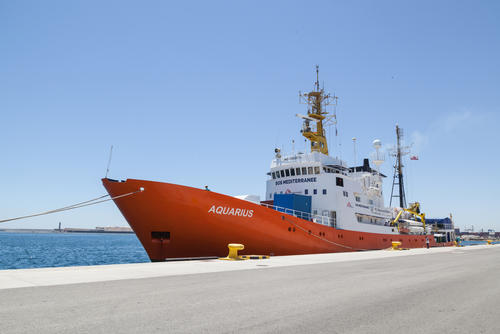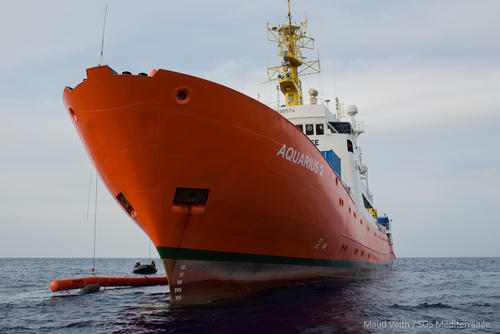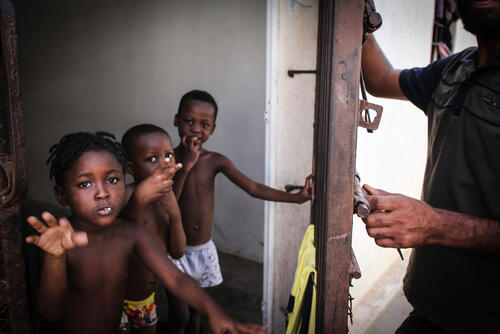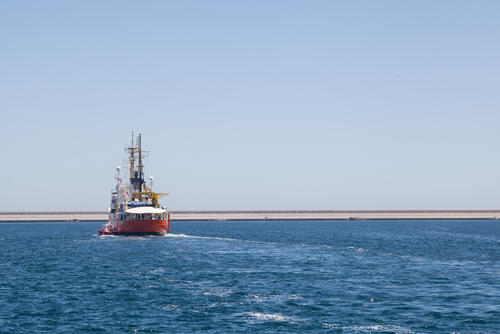- The Italian judicial authorities’ request to seize the Aquarius is a disproportionate and unfounded measure, purely aimed at criminalising lifesaving medical-humanitarian action at sea
- Since 2015, MSF has rescued and assisted over 80,000 people in coordination with maritime authorities and in full compliance with national and international laws
- We will submit an appeal to the Italian review courts

"This isn’t about waste management"
Médecins Sans Frontières (MSF) strongly condemns the decision by Italian judicial authorities to request the seizure of the Aquarius for alleged anomalies in its disposal of on-board waste. It is a disproportionate and unfounded measure, purely aimed at further criminalising lifesaving medical-humanitarian action at sea.
"After two years of defamatory and unfounded allegations of collusion with human traffickers, judicial investigations, and bureaucratic obstacles against our humanitarian work, we are now accused of organised crime aimed at illicit waste trafficking,” says Karline Kleijer, MSF’s head of emergencies.
This latest attempt by the Italian authorities to stop humanitarian lifesaving search and rescue at any cost is sinisterKarline Kleijer, MSF’s head of emergencies
The request to seize the Aquarius, and the order to freeze some of our bank accounts, follows a longstanding investigation by the Prosecutor’s Office of Catania regarding the disposal of on-board waste, with particular reference to food leftovers, the clothes of rescued people, and waste from the ship’s medical activities.
The in-port operations, including waste management, of MSF’s search and rescue vessels have always followed standard procedures. Relevant authorities did not question these procedures, nor did they identify any hazard for public health since MSF began search and rescue operations in 2015.
MSF is fully willing to cooperate with Italian authorities but questions the Public Prosecutor's interpretation of the events and refutes accusations that it was involved in criminal activity aimed at illicit waste management of any kind.
Following an assessment of the seizure decree and an internal review, where the prosecutor’s allegations appear inaccurate or misleading, MSF has decided it will submit an appeal to Italian review courts.
"We are more than ready to clarify the facts and stand accountable for the operational procedures we followed, but we strongly reaffirm the legitimacy and legality of our humanitarian work,” says Gabriele Eminente, general director of MSF in Italy.
This climate of repeated attacks and baseless accusations has led to the real crimes we see today at seaGabriele Eminente, general director of MSF in Italy
“This year alone, more than 2,000 people have perished in the Mediterranean, while still others continue to take the dangerous sea journey with no dedicated search and rescue vessels left to save their lives. Those that do survive are returned to inhumane and arbitrary detention in Libya, in complete disregard for international maritime and refugee law."
“Two years of smear campaigns against search and rescue activities, baseless public accusations of criminal activity, and the closure of places of safety have impeded humanitarian aid and discouraged ships of all kinds from rescuing boats in distress on the Mediterranean Sea.
“The ultimate result is a surge in human suffering, as the European-funded Libyan coastguard returns more and more survivors intercepted in international waters and sends them back to arbitrary detention in Libya, in contravention of international law,” Kleijer continues.
With five humanitarian search and rescue boats spanning three years of operations at sea, MSF has rescued and assisted over 80,000 people in coordination with maritime authorities and in full compliance with national and international laws.
The Aquarius now sits paralysed in Marseille after having its registration flag revoked twice in two months as a result of concerted political pressure.






